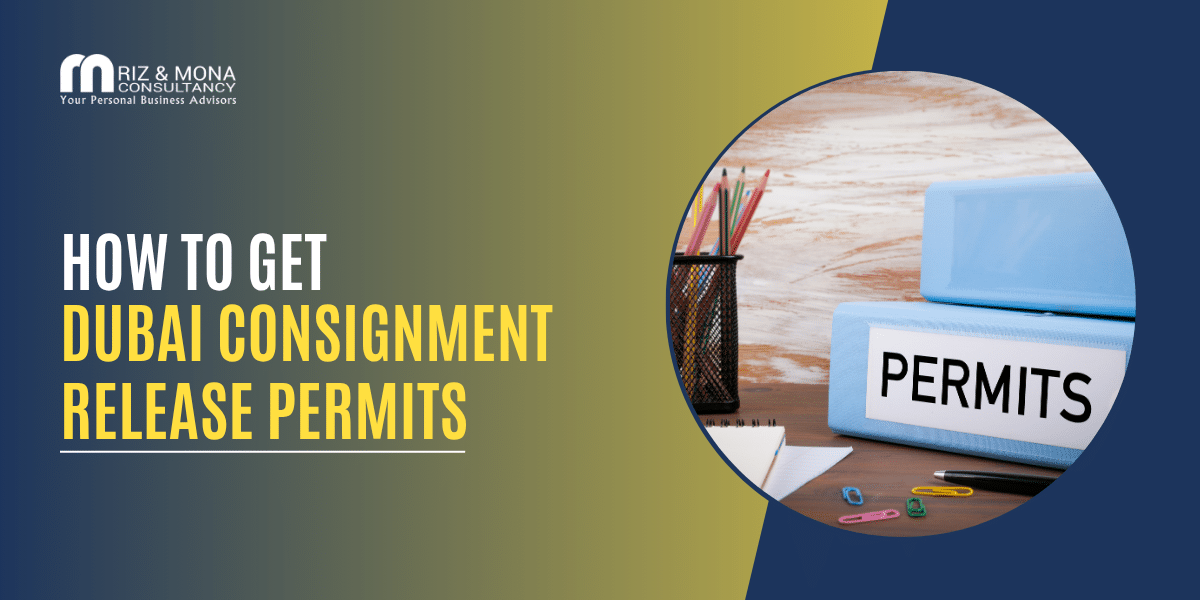Dubai handles billions of dollars worth of imported goods each year, making it one of the world’s busiest trading centers. To bring products into Dubai’s market, businesses must get approval through Dubai Municipality’s consignment release permit system.
These permits make sure that only safe products reach customers while keeping harmful or fake goods out of the market. Getting the right permits is crucial for any business wanting to import consumer products or food items into Dubai successfully.
What Is a Consignment Release Permit?
A consignment release permit is a mandatory authorization document issued by Dubai Municipality that allows importers to legally release goods from customs custody and distribute them in the UAE market or prepare them for re-export through Dubai ports.
Key Functions:
- Customs Release Authorization – Required to move goods from Dubai Customs warehouses to your business premises
- Health & Safety Compliance – Verifies products meet Dubai Municipality’s technical standards and labeling requirements
- Import Documentation – Links your shipment to pre-registered product data in Dubai Municipality systems
- Market Entry Gateway – No goods can enter Dubai’s retail market without this specific permit approval
- Re-export Facilitation – Enables legal transit of goods through UAE ports to other destinations
Processing Systems: Dubai Municipality operates two distinct permit systems: CPIP permits through the Montaji portal for consumer products, and ZDLM permits through the FIRS system for food items, each with specific documentation and inspection requirements.
CPIP Categories
Food Consignment Release Permits (FIRS System) Categories
All Food Products for Human Consumption:
- Packaged Foods – Snacks, cereals, canned goods, frozen products
- Fresh Items – Fruits, vegetables, meat, poultry, seafood
- Beverages – Juices, soft drinks, bottled water, energy drinks
- Dairy Products – Milk, cheese, yogurt, butter
- Bakery and Confectionery – Bread, pastries, sweets, chocolates
- Ingredients and Seasonings – Spices, herbs, condiments, sauces
- Specialized Foods – Organic products, baby food, dietary supplements in food form
The Two Permit Systems: CPIP vs ZDLM
Dubai Municipality operates two distinct consignment release permit systems, each designed for specific product categories with tailored requirements and processing platforms.
Dubai Municipality CPIP Application Process (Consumer Products)
Company Setup
- Register with Dubai Municipality portal and complete Montaji registration with importer code
- Upload trade license and company documents for verification
Product Pre-Registration
- List all products in Montaji system before import (mandatory requirement)
- Obtain product registration approval before proceeding with import requests
Consignment Application
- Create new consignment application with container details, origin country, transport mode
- Complete item listing using direct entry or Excel template
Document Submission
- Upload all required certificates and documentation through online portal
- Pay applicable government fees online
Customs Clearance Integration
- Clear goods through UAE Customs and attach Bill of Entry to Montaji application
- Submit complete application for Dubai Municipality review
Processing and Inspection
- Dubai Municipality reviews application within 2-3 weeks
- Complete inspection process if required and receive permit approval
Processing Timeline: 4-6 weeks total (application to approval)
Need Assistance With CPIP & ZDLM Permit Approvals?
Consumer Products (CPIP) Documentation Requirements
| Category | Required Documents |
|---|---|
| Core Import Papers | • Customs Declaration • Bill of Lading / Airway Bill • Packing List • Commercial Invoice • Certificate of Origin |
| Business Authorization | • Valid UAE Trade License • Warehouse License • Representative Letters (if using agents) |
| Safety Certificates | • Certificate of Analysis (COA) • Good Manufacturing Practice (GMP) Certificate • Laboratory Test Reports • Certificate of Free Sale |
| Product-Specific Requirements | • EN 71 Compliance (toys) • Material Safety Data Sheet (MSDS) for cosmetics • Migration Test Reports (food contact materials) • Safety Data Sheets (chemicals) |
| Claims Documentation | • Organic Certificate (MOCCAE-approved) • GMO-Free Certificate • Halal Certificate (if applicable) |
| System Requirements | • Montaji Registration Certificates • CPIP Reference Number |
Food Products (ZDLM) Documentation Requirements
| Category | Required Documents |
|---|---|
| Core Import Papers | • Health Certificate • Certificate of Origin • Bill of Lading / Airway Bill • Commercial Invoice • Packing List |
| Food Safety Certificates | • Certificate of Analysis (COA) • Nutritional Analysis Report (as per GCC Standard 9-2007) • Allergen Declaration • Shelf Life Validation Report |
| Religious Compliance | • Halal Certificate (meat/poultry) • Pork-Free Diet Certificate (seafood) • Islamic Slaughter Certificate |
| Quality Claims | • Organic Certificate (MOCCAE-approved) • GMO-Free Certificate • Irradiation Certificate (if applicable) |
| Disease Prevention Tests | • BSE-Free Certificate (beef) • Avian Flu Certificate (poultry) • Melamine-Free Report (dairy) • Aflatoxin Test Report (nuts/grains) |
| Label Requirements | • Arabic/English Labels • Translation Certificate • Barcode Registration • Sticker/Label Approval |
| System Documentation | • FIRS Registration Number • Food Product Registration Certificate • Warehouse Inspection Certificate |
ZDLM Application Process (Food Products)
- Submit electronic application with trade license and company details
- Schedule mandatory warehouse inspection for health/safety compliance
Start an online store that sells eco-friendly items like reusable goods, zero-waste personal care, or green packaging. Consumers are actively looking for more sustainable choices.
Offer specialized services such as SEO, social media management, or paid advertising for companies transitioning online. Businesses in the UAE are investing heavily in digital visibility.
- Access FIRS system before shipment arrival
- Complete consignment details including port of entry, airway bill, country of origin
Develop tools for time tracking, project management, or virtual coworking especially tailored to remote teams and freelancers.
Launch an app or subscription platform offering mental health tools, home workouts, personalized fitness plans, or guided nutrition programs.
CPIP (Consumer Products) Timeline Requirements
| Requirement | Timeline | Consequence of Missing |
|---|---|---|
| Import Closure | 3 months from release | Automatic blacklisting |
| Re-Export Closure | 6 months from release | Forced re-export at cost |
| Certificate Validity | 1 year | Operations halt |
| Processing Time | 2-3 weeks | Delays increase costs |
| Product Registration | 5-22 working days | Cannot import |
| Annual Renewal | Before expiry | Compliance investigation |
Food Permits (FIRS System) Timeline Requirements
| Requirement | Timeline | Consequence of Missing |
|---|---|---|
| Document Review | 1-3 working days | Application rejection |
| Laboratory Testing | 5-7 working days | Extended detention |
| Re-Export Deadline | 45 days (rejected goods) | Forced destruction |
| Distribution Ban | Until permit approval | Sales prohibition |
| Permit Validity | Single shipment only | New application required |
| Renewal Cycle | None (fresh per shipment) | Not applicable |
Key Difference: CPIP permits have annual validity with closure deadlines, while food permits are single-use with immediate processing requirements.
Consequences of Non-Compliance
| Violation Type | Financial Penalty | Operational Impact |
|---|---|---|
| CPIP Violations | AED 5,000+ (escalating) | Complete system suspension |
| Food Safety Violations | Up to AED 2,000,000 | Automatic application rejection |
| Storage/Detention | Daily accumulating fees | Goods held indefinitely |
| Re-Export Costs | Full transportation expenses | Supply chain disruption |
| Company Blacklisting | Restoration fees | License renewal suspension |
| Banking Restrictions | Account freezing | Credit rating damage |
Timeline-Specific Violations
| Missed Deadline | Immediate Consequence | Long-Term Impact |
|---|---|---|
| CPIP 3-month closure | Automatic blacklisting | Future permit denial |
| CPIP 6-month re-export | Forced re-export at cost | Compound penalties |
| Food 45-day re-export | Forced destruction | Permanent violation record |
| License Renewal | Operations halt | Compliance investigation |
Fees and Costs for Consignment Reale Permits
| Service Type | Government Fee | Additional Costs | Processing Time |
|---|---|---|---|
| CPIP Application | AED 240 (AED 20 + AED 220) | Container fee: AED 50 | 2-3 weeks |
| CPIP Deposits | AED 1,000 – AED 15,000 | Based on consignment value | Refundable |
| Food Registration (FIRS) | AED 7 per product | Label assessment: AED 20-30 | 1-2 weeks |
| Laboratory Testing | AED 100 – 1,500 per test | When required by authorities | 1-2 weeks |
| Document Translation | AED 300 – 800 per set | Arabic translation required | 2-3 days |
| Certificate Attestation | AED 200 – 400 per document | UAE Embassy attestation | 5-7 days |
Product-Specific Costs
| Product Category | Registration Fee | Testing Requirements | Total Estimated Cost |
|---|---|---|---|
| Cosmetics | AED 240 | Safety testing: AED 500-1,000 | AED 1,000-2,000 |
| Health Supplements | AED 240 | Analysis: AED 200-400 | AED 600-1,000 |
| Food Products | AED 7 | Lab testing: AED 500-1,500 | AED 500-1,800 |
| Toys | AED 240 | EN 71 testing: AED 1,000-2,000 | AED 1,500-3,000 |
| Food Contact Materials | AED 240 | Migration testing: AED 800-1,500 | AED 1,200-2,000 |
Recurring Costs
Annual Requirements:
- CPIP Renewal – AED 240 per year
- FIRS Product Registration – AED 7 per product (no annual fee)
- Product Re-registration – Every 5 years for most categories
Additional Fees:
- Knowledge Fee: AED 10 (for transactions above AED 50)
- Innovation Fee: AED 10 (for transactions above AED 50)
- Customs Clearance: AED 400-1,000 per consignment
FAQS (Frequently Asked Questions)
Does my business need a separate permit for each product line?
CPIP permits cover multiple products per consignment but each product must be individually registered in Montaji beforehand. ZDLM permits are required for every food consignment, with all items properly registered and documented per SKU.
How long does it take to get an online business license?
Dubai Municipality allows special test/sample permits for non-commercial batches, but pre-registration is still required. Food and regulated consumer goods remain subject to mandatory documentation even for sampling purposes.
What are the language requirements for product labels?
All labels must include complete information in both Arabic and English for both CPIP and ZDLM products. Non-compliant translations result in rejection, penalties, and mandatory re-labeling or destruction.
Can I make corrections if my consignment is detained?
Dubai Municipality allows correction windows for missing documentation, with goods released to warehouses under detention during corrections. Repeated non-compliance or missed deadlines lead to rejection, destruction, and company blacklisting.
Are there fast-track processes for large-volume importers?
High-volume importers qualify for annual deposit options and procedural simplifications under CPIP. All documentation and inspection requirements remain mandatory regardless of volume or frequency.
What happens if laboratory test results are delayed?
Consignments remain under warehouse detention until favorable test results are received, with no distribution allowed. Importers bear additional storage costs during extended delays from laboratory testing.
Does Dubai recognize international certificates?
Foreign certificates are accepted only if attested by UAE Embassy in the country of origin. Organic certificates require MOCCAE approval, while halal certificates need recognition from approved Islamic authorities.













